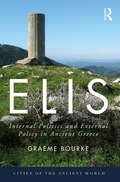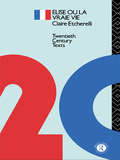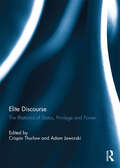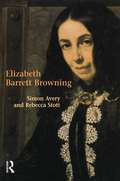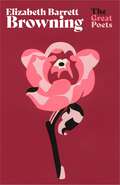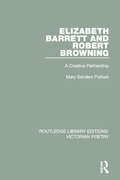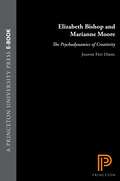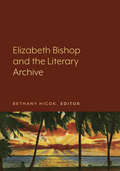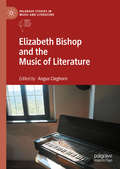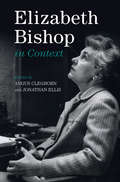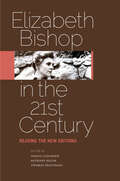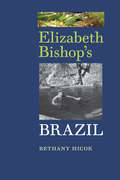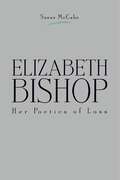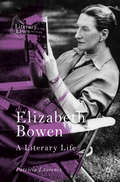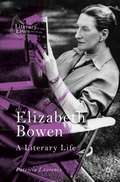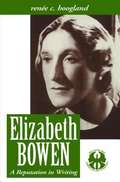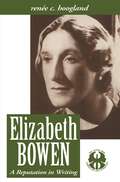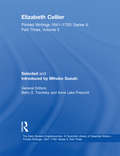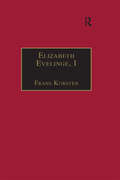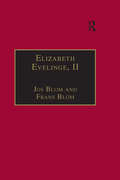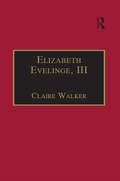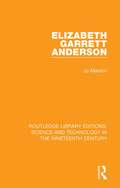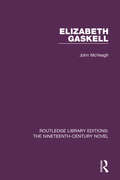- Table View
- List View
Elis: Internal Politics and External Policy in Ancient Greece (Cities of the Ancient World)
by Graeme BourkeElis examines the city of Elis from its earliest history, through the Archaic period and the Classical period where it reached its zenith, to its decline in the Hellenistic, Roman and later periods. Through examining this prominent city-state, its role in contemporary politics and the place of Olympia in its territory, Graeme Bourke allows the reader to explore broader issues, such as the relationship between the Spartans and their various allies, often collectively referred to as ‘the Peloponnesian League’, the connection between political structures and Panhellenic sanctuaries, and the network of relationships between various ancient sanctuaries throughout the Greek-speaking world. The volume, which makes available in English for the first time much of the debate about the city, provides a valuable resource for students and academics studying the city of Elis, the Peloponnese and the relationships within it, and pre-Hellenistic Greece as a whole.
Elise ou la Vraie Vie
by Claire Etcherelli John RoachElise ou la Vraie Vie by Claire Etcherelli. Includes the full French text, accompanied by French-English vocabulary. Notes and a detailed introduction in English put the work in its social and historical context.
Elite Discourse: The rhetorics of status, privilege and power
by Crispin Thurlow and Adam JaworskiElite Discourse examines how language and communication – or just discourse – define, mediate and legitimize class privilege. It does so from the perspective of those people and places who often stand to gain most from inequality. Collectively, chapters consider language and communication that is elitist in its appeal to distinction, excellence and superiority; they also describe the ways in which various groups and institutions lay claim to ‘eliteness’ as a way to position themselves (or to be positioned by others) as elite or non-elite. As such, chapters are concerned as much with discourse about elite status as they are with the discourse of elites – those groups commonly defined by their material wealth, political control, or demographic rarity. Ultimately, Elite Discourse views ‘elite’ as something we do, rather than something we necessarily have or are. Indeed, elite status and eliteness point us to the rhetorical strategies by which many people differentiate themselves and by which they access symbolic-material resources for shoring up their status, privilege and power. This book was originally published as a special issue of Social Semiotics.
Elizabeth Barrett Browning (Studies In Eighteenth and Nineteenth Century Literature Series)
by Rebecca Stott Simon AveryThis volume will provide students with an introduction to the poetry and life of Elizabeth Barrett Browning, one of the most popular poets of her day in Britain and America and who has become one of the great icons of Victorianism for the modern age. The authors present a biographical survey, study of her poetry, its critical reception and an assessment of her influence on later poets. This book also examines the complex 'myths' which are associated with Elizabeth Barrett Browning and offers re-readings of her life and work, particularly in dispelling the myth of the ailing invalid poet-recluse and instead showing her to be one of the great intellectuals of her day, immersed in European history and politics from a very early age. The book situates Browning within broader historical,political and cultural contexts than have yet been examined enabling a better understanding of her poetry and paints the portrait of a fine and innovative poet, an intellectual and an astute political thinker.
Elizabeth Barrett Browning: Much-loved poems from one of the greatest Romantic poets (The Great Poets)
by Elizabeth Barrett Browning'How do I love thee? Let me count the ways'Elizabeth Barrett Browning was a poet of passion, wit and conscience. She was also a woman who wrote to speak the truth about everything she knew - and she knew just what it was like to be a thinking woman in a society that wanted women to be weak. The eldest of twelve children, she wrote poetry from the age of eleven, and became a highly successful poet in her lifetime - and remains very much loved today.She was also a strong advocate for human rights, campaigning to abolish slavery and child labour, and her three-part poem A Curse for a Nation is a powerful polemic against the slave trade.'I heard an angel speak last night, and he said "write! Write a nation's curse for me, and send it over the western sea" '
Elizabeth Barrett Browning: Much-loved poems from one of the greatest Romantic poets (The Great Poets)
by Elizabeth Barrett Browning'How do I love thee? Let me count the ways'Elizabeth Barrett Browning was a poet of passion, wit and conscience. She was also a woman who wrote to speak the truth about everything she knew - and she knew just what it was like to be a thinking woman in a society that wanted women to be weak. The eldest of twelve children, she wrote poetry from the age of eleven, and became a highly successful poet in her lifetime - and remains very much loved today.She was also a strong advocate for human rights, campaigning to abolish slavery and child labour, and her three-part poem A Curse for a Nation is a powerful polemic against the slave trade.'I heard an angel speak last night, and he said "write! Write a nation's curse for me, and send it over the western sea" '
Elizabeth Barrett and Robert Browning: A Creative Partnership (Routledge Library Editions: Victorian Poetry #4)
by Mary Sanders PollockFirst published in 2003, this book examines the creative partnership of Elizabeth Barrett and Robert Browning, and provides a critical analysis of the poems written by this famous couple during the 16 year period of their friendship, courtship and marriage. Even quite early in their relationship, the Brownings shared a frame of reference: similar themes, narrative structures, and details of phrasing resonate in their works and suggest dialogue, rather than merely mutual influence. Pollock traces parallels between the Brownings' lives and works even before they met, and then throughout their courtship and married life, suggesting that their creative dialogue continued after Barrett Browning died in 1861, as her presence and themes continued to inform Browning's poetry for at least a decade afterward.
Elizabeth Bishop and Marianne Moore: The Psychodynamics of Creativity
by Joanne Feit DiehlThis highly innovative work on poetic influence among women writers focuses on the relationship between modernist poet Elizabeth Bishop and her mentor Marianne Moore. Departing from Freudian models of influence theory that ignore the question of maternal presence, Joanne Diehl applies the psychoanalytic insights of object relations theorists Melanie Klein and Christopher Bollas to woman-to-woman literary transactions. She lays the groundwork for a far-reaching critical approach as she shows that Bishop, mourning her separation from her natural mother, strives to balance gratitude toward Moore, her literary mother, with a potentially disabling envy.Diehl begins by exploring Bishop's memoir of Moore, "Efforts of Affection," as an attempt by Bishop to verify Moore's uniqueness in order to defend herself against her predecessor's almost overwhelming originality. She then offers an intertextual reading of the two writers' works that inquires into Bishop's ambivalence toward Moore. In an analysis of "Crusoe in England" and "In the Village," Diehl exposes the restorative impulses that fuel aesthetic creation and investigates how Bishop thematizes an understanding of literary production as a process of psychic compensation.
Elizabeth Bishop and the Literary Archive
by Bethany HicokIn a life full of chaos and travel, Elizabeth Bishop managed to preserve and even partially catalog, a large collection—more than 3,500 pages of drafts of poems and prose, notebooks, memorabilia, artwork, hundreds of letters to major poets and writers, and thousands of books—now housed at Vassar College. Informed by archival theory and practice, as well as a deep appreciation of Bishop’s poetics, the collection charts new territory for teaching and reading American poetry at the intersection of the institutional archive, literary study, the liberal arts college, and the digital humanities. The fifteen essays in this collection use this archive as a subject, and, for the first time, argue for the critical importance of working with and describing original documents in order to understand the relationship between this most archival of poets and her own archive. This collection features a unique set of interdisciplinary scholars, archivists, translators, and poets, who approach the archive collaboratively and from multiple perspectives. The contributions explore remarkable new acquisitions, such as Bishop’s letters to her psychoanalyst, one of the most detailed psychosexual memoirs of any twentieth century poet and the exuberant correspondence with her final partner, Alice Methfessel, an important series of queer love letters of the 20th century. Lever Press’s digital environment allows the contributors to present some of the visual experience of the archive, such as Bishop’s extraordinary “multi-medial” and “multimodal” notebooks, in order to reveal aspects of the poet’s complex composition process.
Elizabeth Bishop and the Music of Literature (Palgrave Studies in Music and Literature)
by Angus CleghornElizabeth Bishop and the Music of Literature brings together the latest understandings of how central music was to Bishop’s writing. This collection considers Bishop’s reworking of metrical and rhythmic forms of poetry; the increasing presence of prosaic utterances into speech-soundscapes; how musical poetry intones new modes of thinking through aural vision; how Bishop transforms traditionally distasteful tones of violence, banality, and commerce into innovative poetry; how her diverse, lifelong musical education (North American, European, Brazilian) affects her work; and also how her diverse musical settings have inspired global contemporary composers. The essays flesh out the missing elements of music, sound, and voice in previous research that are crucial to understanding how Bishop’s writing continues to dazzle readers and inspire artists in surprising ways.
Elizabeth Bishop at Work
by Eleanor CookCritics and biographers praise Elizabeth Bishop's poetry but have little to say about how it does its sublime work--in the ear and in the mind's eye. Eleanor Cook examines in detail Bishop's diction, syntax, rhythm, and meter, her acute sense of place, and her attention to the natural world. Writers, readers, and teachers will all benefit.
Elizabeth Bishop in Context (Literature in Context)
by Angus Cleghorn Jonathan EllisElizabeth Bishop is increasingly recognised as one of the twentieth century's most original writers. Consisting of thirty-five ground-breaking essays by an international team of authors, including biographers, literary critics, poets and translators, this volume addresses the biographical and literary inception of Bishop's originality, from her formative upbringing in New England and Nova Scotia to long residences in New York, France, Florida and Brazil. Her poetry, prose, letters, translations and visual art are analysed in turn, followed by detailed studies of literary movements such as surrealism and modernism that influenced her artistic development. Bishop's encounters with nature, music, psychoanalysis and religion receive extended treatment, likewise her interest in dreams and humour. Essays also investigate the impact of twentieth-century history and politics on Bishop's life writing, and what it means to read Bishop via eco-criticism, postcolonial theory and queer studies.
Elizabeth Bishop in the Twenty-First Century: Reading the New Editions
by Angus Cleghorn, Bethany Hicok and Thomas TravisanoIn recent years, a series of major collections of posthumous writings by Elizabeth Bishop--one of the most widely read and discussed poets of the twentieth century--have been published, profoundly affecting how we look at her life and work. The hundreds of letters, poems, and other writings in these volumes have expanded Bishop‘s published work by well over a thousand pages and placed before the public a "new" Bishop whose complexity was previously familiar to only a small circle of scholars and devoted readers. This collection of essays by many of the leading figures in Bishop studies provides a deep and multifaceted account of the impact of these new editions and how they both enlarge and complicate our understanding of Bishop as a cultural icon.Contributors: Charles Berger, Southern Illinois University, Edwardsville * Jacqueline Vaught Brogan, University of Notre Dame * Angus Cleghorn, Seneca College * Jonathan Ellis, University of Sheffield * Richard Flynn, Georgia Southern University * Lorrie Goldensohn * Jeffrey Gray, Seton Hall University * Bethany Hicok, Westminster College * George Lensing, University of North Carolina * Carmen L. Oliveira * Barbara Page, Vassar College * Christina Pugh, University of Illinois at Chicago * Francesco Rognoni, Catholic University in Milan * Peggy Samuels, Drew University * Lloyd Schwartz, University of Massachusetts, Boston * Thomas Travisano, Hartwick College * Heather Treseler, Worcester State University * Gillian White, University of Michigan
Elizabeth Bishop's Brazil
by Bethany HicokWhen the American poet Elizabeth Bishop arrived in Brazil in 1951 at the age of forty, she had not planned to stay, but her love affair with the Brazilian aristocrat Lota de Macedo Soares and with the country itself set her on another course, and Brazil became her home for nearly two decades. In this groundbreaking new study, Bethany Hicok offers Bishop’s readers the most comprehensive study to date on the transformative impact of Brazil on the poet’s life and art. Based on extensive archival research and travel, Elizabeth Bishop’s Brazil argues that the whole shape of Bishop’s writing career shifted in response to Brazil, taking on historical, political, linguistic, and cultural dimensions that would have been inconceivable without her immersion in this vibrant South American culture. Hicok reveals the mid-century Brazil that Bishop encountered--its extremes of wealth and poverty, its spectacular topography, its language, literature, and people--and examines the Brazilian class structures that placed Bishop and Macedo Soares at the center of the country’s political and cultural power brokers. We watch Bishop develop a political poetry of engagement against the backdrop of America’s Cold War policies and Brazil’s political revolutions. Hicok also offers the first comprehensive evaluation of Bishop’s translations of Brazilian writers and their influence on her own work. Drawing on archival sources that include Bishop’s unpublished travel writings and providing provocative new readings of the poetry, Elizabeth Bishop’s Brazil is a long-overdue exploration of a pivotal phase in this great poet’s life and work.
Elizabeth Bishop: Her Poetics of Loss (G - Reference, Information and Interdisciplinary Subjects)
by Susan McCabeElizabeth Bishop represents a full-scale examination of Bishop's work—poetry, prose, and selected unpublished material—to reveal how personal loss becomes implicated in her vision of self as fluid and unfixed and, at the same time, how gender and sexual identity inform the experience of loss in the act of writing. Susan McCabe argues that Bishop counters modernist claims for an autonomous art object and an impersonal artist; Bishop's writing never represents an escape into perfected forms, but instead calls attention to the processes of language that construct identity. McCabe emphasizes how personal experience is deeply enmeshed with Bishop's poetics. Bishop's project returns to her early losses—the death of her father and her mother's madness—and uses them to disclose the instability of the concepts of self or place through a rhetoric of indeterminacy and uncertainty. Although Bishop has recently begun to receive the critical attention she deserves, this book uniquely brings loss to the foreground in connection with identity, gender, and the fashioning of a feminist poetics.
Elizabeth Bowen: A Literary Life (Literary Lives)
by Patricia LaurenceElizabeth Bowen: A Literary Life reinvents Bowen as a public intellectual, propagandist, spy, cultural ambassador, journalist, and essayist as well as a writer of fiction. Patricia Laurence counters the popular image of Bowen as a mannered, reserved Anglo-Irish writer and presents her as a bold, independent woman who took risks and made her own rules in life and writing. This biography distinguishes itself from others in the depth of research into the life experiences that fueled Bowen’s writing: her espionage for the British Ministry of Information in neutral Ireland, 1940-1941, and the devoted circle of friends, lovers, intellectuals and writers whom she valued: Isaiah Berlin, William Plomer, Maurice Bowra, Stuart Hampshire, Charles Ritchie, Sean O’Faolain, Virginia Woolf, Rosamond Lehmann, and Eudora Welty, among others. The biography also demonstrates how her feelings of irresolution about national identity and gender roles were dispelled through her writing. Her vivid fiction, often about girls and women, is laced with irony about smooth social surfaces rent by disruptive emotion, the sadness of beleaguered adolescents, the occurrence of cultural dislocation, historical atmosphere, as well as undercurrents of violence in small events, and betrayal and disappointment in romance. Her strong visual imagination—so much a part of the texture of her writing—traces places, scenes, landscapes, and objects that subliminally reveal hidden aspects of her characters. Though her reputation faltered in the 1960s-1970s given her political and social conservatism, now, readers are discovering her passionate and poetic temperament and writing as well as the historical consciousness behind her worldly exterior and writing.
Elizabeth Bowen: A Literary Life (Literary Lives)
by Patricia LaurenceElizabeth Bowen: A Literary Life reinvents Bowen as a public intellectual, propagandist, spy, cultural ambassador, journalist, and essayist as well as a writer of fiction. Patricia Laurence counters the popular image of Bowen as a mannered, reserved Anglo-Irish writer and presents her as a bold, independent woman who took risks and made her own rules in life and writing. This biography distinguishes itself from others in the depth of research into the life experiences that fueled Bowen’s writing: her espionage for the British Ministry of Information in neutral Ireland, 1940-1941, and the devoted circle of friends, lovers, intellectuals and writers whom she valued: Isaiah Berlin, William Plomer, Maurice Bowra, Stuart Hampshire, Charles Ritchie, Sean O’Faolain, Virginia Woolf, Rosamond Lehmann, and Eudora Welty, among others. The biography also demonstrates how her feelings of irresolution about national identity and gender roles were dispelled through her writing. Her vivid fiction, often about girls and women, is laced with irony about smooth social surfaces rent by disruptive emotion, the sadness of beleaguered adolescents, the occurrence of cultural dislocation, historical atmosphere, as well as undercurrents of violence in small events, and betrayal and disappointment in romance. Her strong visual imagination—so much a part of the texture of her writing—traces places, scenes, landscapes, and objects that subliminally reveal hidden aspects of her characters. Though her reputation faltered in the 1960s-1970s given her political and social conservatism, now, readers are discovering her passionate and poetic temperament and writing as well as the historical consciousness behind her worldly exterior and writing.
Elizabeth Bowen: A Reputation in Writing
by Renee C. HooglandImmensely popular during her lifetime, the Anglo-Irish writer Elizabeth Bowen (1899-1973) has since been treated as a peripheral figure on the literary map. If only in view of her prolific output--ten novels, nearly eighty short stories, and a substantial body of non- fiction--Bowen is a noteworthy novelist. The radical quality of her work, however, renders her an exceptional one. Surfacing in both subject matter and style, her fictions harbor a subversive potential which has hitherto gone unnoticed. Using a wide range of critical theories-from semiotics to psychoanalysis, from narratology to deconstruction-this book presents a radical re-reading of a selection of Bowen's novels from a lesbian feminist perspective. Taking into account both cultural contexts and the author's non-fictional writings, the book's main focus is on configurations of gender and sexuality. Bowen's fiction constitutes an exploration of the unstable and destabilizing effects of sexuality in the interdependent processes of subjectivity and what she herself referred to as so-called reality.
Elizabeth Bowen: A Reputation in Writing (The Cutting Edge: Lesbian Life and Literature Series)
by Renee Carine HooglandImmensely popular during her lifetime, the Ango-Irish writer Elizabeth Bowen (1899-1973) has since been treated as a peripheral figure on the literary map. If only in view of her prolific outputten novels, nearly eighty short stories, and a substantial body of non- fictionBowen is a noteworthy novelist. The radical quality of her work, however, renders her an exceptional one. Surfacing in both subject matter and style, her fictions harbor a subversive potential which has hitherto gone unnoticed. Using a wide range of critical theories-from semiotics to psychoanalysis, from narratology to deconstruction-this book presents a radical re-reading of a selection of Bowen's novels from a lesbian feminist perspective. Taking into account both cultural contexts and the author's non-fictional writings, the book's main focus is on configurations of gender and sexuality. Bowen's fiction constitutes an exploration of the unstable and destabilizing effects of sexuality in the interdependent processes of subjectivity and what she herself referred to as so-called reality.
Elizabeth Cellier: Printed Writings 1641–1700: Series II, Part Three, Volume 5 (The Early Modern Englishwoman: A Facsimile Library of Essential Works & Printed Writings, 1641-1700: Series II, Part Three)
by Mihoko SuzukiElizabeth Cellier, the scandalous celebrity known as the 'Popish midwife', became the focus of a large number of pamphlets in 1680: accounts of her two trials, her self-vindication, Malice Defeated, her opponent Thomas Dangerfield's rejoinder, and various anonymous satiric attacks against her. She was tried twice: the first time for the more serious charge of treason, and the second for libel, for publishing Malice Defeated. She was acquitted the first time, but found guilty the second, though her punishment was to be pilloried, not executed. She reemerges as the author of tracts on midwifery, proposing to James II the establishment of a professional guild of midwives. Her writings exhibit her remarkable determination to publish her accusations of judicial torture and her advocacy of the licensing of midwives as professional women, as well as exemplifying the importance of the printing press for enabling women to participate in the political public sphere.
Elizabeth Evelinge, I: Printed Writings 1500–1640: Series I, Part Three, Volume 3 (The Early Modern Englishwoman: A Facsimile Library of Essential Works & Printed Writings, 1500-1640: Series I, Part Three #Pt. 3)
by Frans KorstenThe history of the angelicall virgin glorious S.Clare (Douai 1635) is a translation by 'Sister Magdalen' of a work by the Franciscan priest François Hendricq, Vie admirable de madame S. Claire fondatrice des Pauvres Clairesses (1631). In its turn Hendricq's book is largely a translation of parts of Luke Wadding's Annales ordinis minorum ('Annals of the Franciscan Order'). These volumes include an account of the activities of the young woman, Clara Offreduccio di Favarone, one of the many followers of St. Francis of Assisi. In 1212 Clara was advised by St. Francis to withdraw to the monastery at San Damiano in Assisi. In this way St. Francis founded his Second Order, an order of religious women known as the Poor Clares. 'Sister Magdalen' has been identified as Elizabeth Evelinge who belonged to a dissident group of Poor Clares that left their English convent at Gravelines in 1627 and started a new convent at Aire in May 1629. The copy of her translation reproduced in this volume is that of Heythrop College, University of London.
Elizabeth Evelinge, II: Printed Writings 1500–1640: Series I, Part Three, Volume 5 (The Early Modern Englishwoman: A Facsimile Library of Essential Works & Printed Writings, 1500-1640: Series I, Part Three #Pt. 3)
by Jos BlomThe declarations and ordinances made upon the rule of our holy mother S.Clare is an English translation of papal pronouncements upon the rules governing the convents of the Franciscan Order of St Clare. Elizabeth Evelinge's 176-page English version was published by one of the most prolific presses of the 17th-century English Roman Catholic exiles, the English College Press at St Omer. The edition, which was presumably very limited, was meant for English nuns living in monasteries in Flanders and Northern France. At her death, Elizabeth Evelinge was described as having 'a more polish'd way of writing above her sex. Her translation of The declarations at the age of just 25, testifies to her skills. The copy of the text reproduced here is that held at the Franciscan Library at Killiney.
Elizabeth Evelinge, III: Printed Writings 1500–1640: Series I, Part Four, Volume 1 (The Early Modern Englishwoman: A Facsimile Library of Essential Works & Printed Writings, 1500-1640: Series I, Part Four)
by Claire WalkerElizabeth Evelinge, now firmly believed to have been the translator of The admirable life of the holy virgin S. Catharine of Bologna, entered the English Poor Clare monastery in Gravelines in 1620. After ongoing dissension at Gravelines, along with Catharine Bentley (originally believed to be the translator) she founded a new cloister at Aire. Evelinge served as abbess here for 25 years. Her 1621 translation of Catharine of Bologna's life and Spiritual weapons, with their exemplary advice about how to survive the temptations and conflicts of cloistered life, aimed at assisting the troubled English Poor Clares in their time of need. Whether designed to further the Franciscan cause within the cloister or simply to offer solace, the translation of this text occurred because of the dissension in the house at Gravelines. Moreover, it is possible that Catharine of Bologna represented so compelling a model of Poor Clare spirituality that Elizabeth Evelinge, whose piety and talents mirrored those of her subject, deemed herself too humble to ascribe her intellectual achievements to herself, which led to the debate about who translated the text.
Elizabeth Garrett Anderson (Routledge Library Editions: Science and Technology in the Nineteenth Century #5)
by Jo MantonFirst published in 1965. In 1865, a woman first obtained a legal qualification in this country as physician and surgeon. Elizabeth Garrett surprised public opinion by the calm obstinacy with which she fought for her own medical education and that of the young women who followed her. This full biography is based largely on unpublished material from the hospitals and medical schools where Elizabeth Garrett Anderson worked, and the private papers of the Garrett and Anderson families. This title will be of great interest to history of science students.
Elizabeth Gaskell (Routledge Library Editions: The Nineteenth-Century Novel #26)
by John McVeaghFirst published in 1970, this study demonstrates both the range and essential unity of the works of Mrs. Gaskell. The author analyses the novels of social criticism, the biography of Charlotte Brontë and the novels of country life as distinct expressions of her genius, commenting on recurrent themes, typical methods of presentation and consistent attitudes as they appear in each of the works. The differences of subject and intention between the three kinds of writing will be seen in the extracts which indicate the range of her ability and interests. The final section summarises her range and success and failure. This book will be of interest to students of literature and sociological history.
